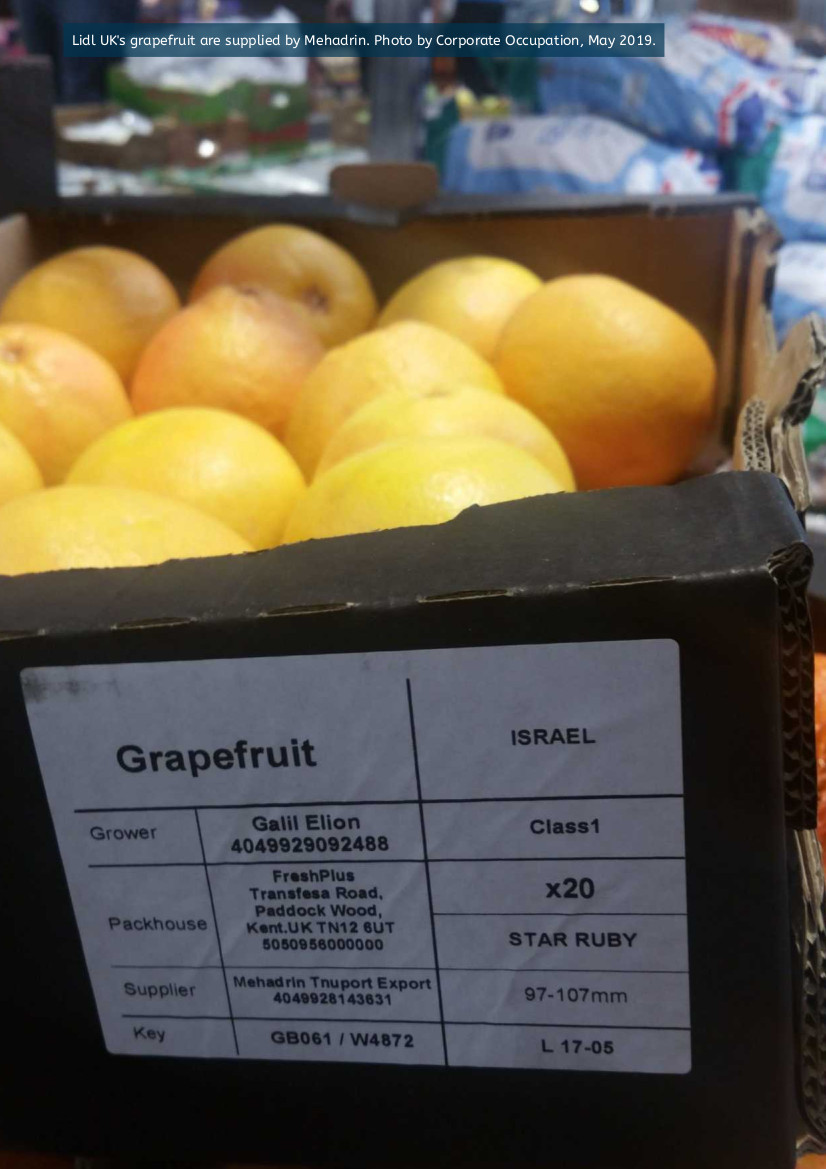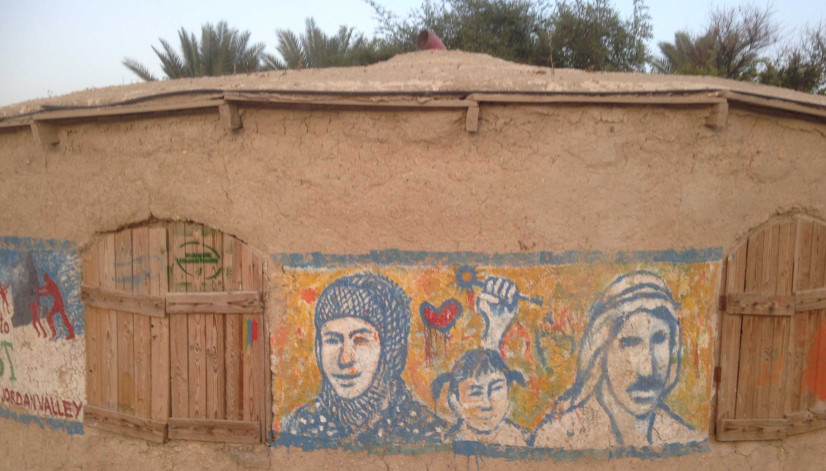Ever since the first Palestinian call for boycott, divestment and sanctions against Israel in 2005, French multinational Veolia has been on campaigners’ list of boycott targets for its investment in the controversial East Jerusalem tram line and involvement in ‘settlers only’ bus routes. As a result of high profile boycott campaigns around the world, Veolia last year attempted to abandon its part in the tram line project (see previous articles: 1 | 2). But Veolia’s shameless facilitation of settlement infrastructure does not end there. On a recent visit to the area, Corporate Watch investigated the impact of Veolia’s other big operation on occupied land: the Tovlan landfill.
Established in 1999, Tovlan is situated deep inside the Jordan Valley in the West Bank, on land cleansed of Palestinians after the occupation of the area in 1967. According to Veolia, operating the landfill can not be considered unethical or in breach of their guidelines as the dump allegedly provides services to both Palestinians and Israeli settlers. The company sign of Veolia’s subsidiary ONYX proudly advertises its business at the front gate. However, the Tovlan site is managed by the Israeli settlement regional council of Biqat Hayarden, which covers 21 illegal settlements, and the land is leased from the occupier: Israeli’s civil administration. There is little evidence of the much-talked-about benefits for the surrounding Palestinian communities, as a meeting with an ex-Tovlan employee confirms.
Inside Tovan
Mohammed* worked at the Tovlan landfill for seven years, between 2002 and February 2009, and has seen most of what goes on inside the plant. His job was to check the cars that entered the area and to keep a log of all traffic. When asked whether any of the waste he encountered came from Palestinian areas, he shakes his head. It is true, he says, that they used to receive some collections from Nablus, but that stopped completely over two years ago. Whilst technically Palestinian municipalities are allowed to use the facilities, in reality the rates charged for the service is far above what they can afford. Palestinians used to pay 40 Shekels (£6.60) to dump a ton of waste, and had to pay extra for collection. The figures that the Israeli settlements pay are kept secret even from the workers, he says, but he has been told that they are lower. According to Mohammed, the waste dumped at the Tovlan landfill comes primarily from the numerous illegal settlements in the Jordan Valley. But some hazardous waste, such as used needles, appears to arrive from hospitals inside Israel. Those items are then incinerated on the premises. It is not only the physical landfill which is controversial about Veolia’s business in the Valley. The facility is also home to a settlement sewage water plant and is able to generate electricity using the gas extracted from the dumped waste. Whilst this might sound like a sensible way of utilising the rubbish, it irrefutably implicates Veolia in Israel’s brutal apartheid system, as any energy generated is exclusively used by the nearby settlements. One of the ways in which the Israeli Government encourages their citizens to relocate to the Jordan Valley is by offering generous subsidies for utilities, including electricity. Meanwhile, nearby Palestinian villages such as Fasayil and Abu Ajaj are denied the right to electricity altogether by the occupation authorities.
Settlement labour
Except for the two Israeli bosses, the work force at Tovlan is entirely Palestinian. For these, the conditions seem in no way better than those documented at other settlement businesses (see this Corporate Watch article, for example). They work between 6am and 4pm, with a 45-minute break, and earn 80 Shekels (£13.35) a day – well under the legally required Israeli minimum wage of 154 NIS a day (£25.71). Despite working at the plant for seven years, Mohammed did not have a contract but was simply informed of the hours he could work on a weekly basis. As the work can be dangerous, especially for the people working with the waste on the diggers, the employees are required to attend a safety lecture every three months. Workers, however, are not provided with any safety clothing or equipment and constantly fear accidents, particularly in relation to the dangers of explosions associated with gas extraction. If accidents happened, injured workers are taken to hospital but are not paid compensation. For example, one of Mohammed’s co-workers fell over with the tractor three years ago and injured his neck. He is still out of work with no compensation or any source of income. Mohammed himself was suddenly dismissed by his employers in February 2009, with no reason given. He is still owed 4,500 Shekels of unpaid wages, equaling three and a half months worth of work. As there is no union representation at the plant, he has had to find a lawyer to try and get his money back; a difficult decision for someone who is still unemployed.
Tovlan’s wider impact
Rather than benefiting the Palestinians living next to the landfill, its existence in the area is deeply problematic for them. The two families who live nearest to Tovlan are forced to move elsewhere in the summer when the smell from the waste becomes too bad, only to move back during the winter season when it is bearable. Mohammed also testifies to the harmful health impact of the site. “Before I was dismissed from my job,” he says, “I could only work for four minutes at a time without taking a small break as the smells were so bad. My health has improved a lot since I left.” In Abu Ajaj, the closest village to Tovlan, the negative impact has also been noted. Since the landfill was established, its people have begun suffering from persistent coughs and breathing difficulties. The worst thing, however, they tell Corporate Watch, is the impact it has on their animals: the animals now live for a shorter time than before and an increase in stillborn babies has been recorded, a very serious development for a small community relying on animal breeding. A heavy increase in flies and mosquitoes attracted by the landfill has further complicated their existence there. Abu Ajaj is a community which has already suffered severely from the occupation. The area used to be home to many thousands of people; now there are only around 200 inhabitants living in harsh conditions. Whilst the Israelis in the Massua settlement across the road have proper infrastructure that enables them to live unaffected by those problems, the people of Abu Ajaj mainly live in shacks, without running water or electricity, and are prevented from improving their living conditions by the Israelis.
A new Tovlan?
The ‘Derail Veolia’ campaign has had some pretty successful victories of late and there are indications that this might be a good time to build on that momentum. According to Mohammed, there are plans to stop using Tovlan for waste disposal in the next two years and to open a new landfill site somewhere else in the Jordan Valley, whilst building on the electricity generating capabilities which will continue to exist on the old site. Veolia should not be allowed to be under the illusion that continued involvement in either is acceptable. For more information, see www.bigcampaign.org/veolia and www.bds-movement.net * Names in this article have been changed to protect their owners.
For original article see here http://www.corporatewatch.org/?lid=3514
Apartheid in the Fields: From Occupied Palestine to UK Supermarkets (2020 Update), Endnotes
Here are the references for our 2020 update to Apartheid in the Fields P3. Introduction https://mondoweiss.net/2019/11/un-publishes-database-ofcompanies-profiting-off-human-rights-abuses-not-on-israel-but-myanmar/ P4. The ongoing ethnic cleansing of the Jordan Valley https://btselem.org/jordan_valley See, for example, https://corporateoccupation.org/2010/08/11/the-jordan-valley-meeting-point-the-jewish-national-funds-racist-alternative-reality/ https://m.btselem.org/jordan_valley http://jordanvalleysolidarity.org/reports/al-jazeera-how-israel-engages-in-water-apartheid/ http://jordanvalleysolidarity.org/reports/al-jazeera-how-israel-engages-in-water-apartheid/ http://jordanvalleysolidarity.org/news/tractors-and-water-tanks-confiscated-in-al-maleh/ http://jordanvalleysolidarity.org/wp-content/uploads/2008/03/jv%20map%20tony.jpg Read more



4 Comments
stellacuchinetta · 20th July 2010 at 5:20 pm
Interesting – I has a smiliar response from Brighton Council when I wrote to ask them about their views on Veolia operating within the City.
I don’t suppose the claims made by Veolia – ‘engaging with NGOs etc ‘ have any evidence to support them?
tomandersoncw · 13th August 2010 at 6:29 pm
Veolia do engage with NGOs as a policy, as many companies do, to greenwash their image. Do you mean engaging with NGOs in Palestine?
Galloway, Respect, Lutfur Rahman & the Mayoral Seat « Tower Hamlets Watch · 1st July 2010 at 5:49 pm
[…] Read his letter to Galloway, he asked an organisation which stands accused by some of abusing human rights, if it was abusing human rights?…..can you really believe the gall of this weazely litter creature?, what the hell did he think they were going to say? He could have called for the disolution of the contracts on moral grounds, or pushed for them arguing the case under the Councils “Corporate Social Responsibility” charter, but no. In a borough whos history is littered with stories of people who risked everything, not least of which is the story of George Lansbury and the Poplar Rates Rebellion of 1921 he does nothing except ask some questions and then lays back in his gilded office, sure that he’s put the world to rights, not caring at all about Veolia’s ‘dirty little business’. […]
VEOLIA: Still doing Israel’s dirty work: Veolia’s Tovlan landfill in the Jordan Valley · 15th July 2010 at 4:34 pm
[…] Corporate Watch has previously reported (see here and here)Veolia run the Tovlan landfill site in the Occupied Jordan Valley as well as provide rubbish […]